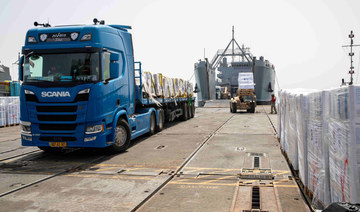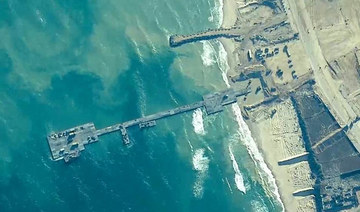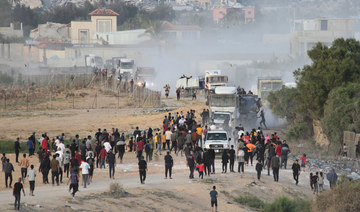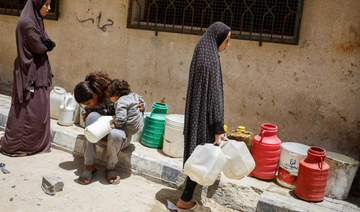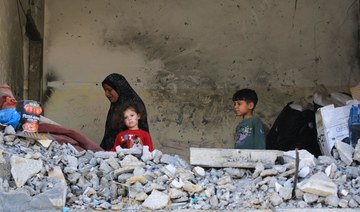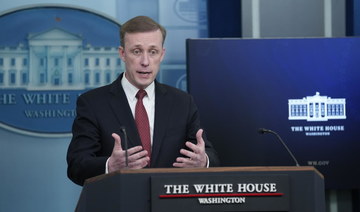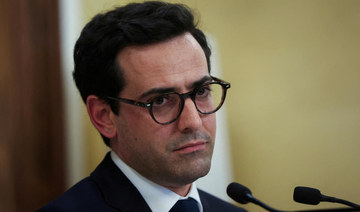GAZA: Tens of thousands of people crammed into a street in Rafah, the southern Gaza city where vast numbers have sought refuge from advancing Israeli ground troops.
“These are the worst months of our lives,” said Noha Al-Madhun, who fled from the Beit Lahia area of northern Gaza and was taken in by relatives along with some of her children.
“My husband and eldest sons sleep in a tent. There’s no space for everyone. We sleep on the floor and we feel the cold” without enough blankets to go round, she said.
“There aren’t enough apartments or even places to set up extra tents,” added Madhun.
More than half of Gaza’s population of 2.4 million is in Rafah, on the border with Egypt, according to the United Nations.
Those without relatives to host them or the means to rent apartments have found themselves in tents wherever there is space: along streets, in public squares, sports stadiums or parks.
Abdulkarim Misbah, 32, said he left his home in the northern Jabalia refugee camp and reached Khan Yunis, only to be uprooted once more.
“We escaped last week from death in Khan Yunis, without bringing anything with us. We didn’t find a place to stay. We slept on the streets the first two nights. The women and children slept in a mosque,” he said.
Then they received a donated tent, setting it up right beside the Egyptian border.
“My four children are shivering from the cold. They feel sick and unwell all the time,” said Misbah.
Most people are concentrated in the city center or west, trying to avoid the eastern edges toward the Israeli border or the north which is dangerously close to fighting in nearby Khan Yunis.
After the war erupted on October 7 with Hamas militants’ unprecedented attack on Israel, the country’s military ordered Gazans to leave their homes in the north.
Those instructions have since expanded, forcing many Palestinians to flee time and again.
Gaza City resident Amjad Abdel Aal, who fled to a school shelter in Rafah, said it took her two hours to be driven a distance which before the war would take just 15 minutes.
“The congestion was awful,” she said, waiting in a wheelchair in a long line for donations of blankets and mattresses.
“There aren’t a lot of cars because of the fuel shortage. Everyone walks, rides a truck or donkey cart,” added the barefoot 28-year-old.
The United Nations estimates 1.7 million have been forced from their homes by the war since October 7.
The Hamas attack on Israel resulted in the deaths of around 1,160 people, mostly civilians, according to an AFP tally based on official figures.
Israel’s withering offensive has killed at least 27,131 people in Gaza, mostly women and children, according to the health ministry in the Hamas-run territory.
With Egypt’s border firmly shut to most Gazans throughout the war, the streets of Rafah have become packed with displaced people.
Mehran Dabbabish, 41, a taxi driver from Khan Yunis, said the situation was “getting worse by the day.”
“The road between Khan Yunis and Rafah used to take 20 to 30 minutes at worst. Today, the shortest trip within Rafah takes an hour and a half to two hours,” he told AFP.
The overcrowding is putting a massive strain on everyone and means moving anywhere, by any means, is incredibly difficult.
Another Gazan, Naima Al-Bayumi, lamented how tired she was just halfway through a four-hour journey by foot to visit her relative in hospital.
“I rode a donkey cart a few times and fell off because of the intense scramble,” she told AFP.
Bayumi started crying as she recounted the bombardment which hit her home, killing her baby twins.
“I gave birth to them in the first week of the war, after 13 years of marriage,” said the 38-year-old, who lives in a tent with her husband.
“I don’t want to live anymore,” she said.
Elsewhere on the road, people helped another woman clamber aboard a truck filled with dozens of passengers.
She clung to the side of the truck with her baby, to stop them falling out, and screamed: “Death is more merciful than this life!”
‘No space for everyone’: Rafah overwhelmed with fleeing Gazans
https://arab.news/93hfe
‘No space for everyone’: Rafah overwhelmed with fleeing Gazans

- Hostilities in Khan Younis have forced more people to flee to Rafah
- More than half of Gaza’s population of 2.4 million is in Rafah, on the border with Egypt
More aid getting from US pier to people in Gaza, officials say, after troubled launch
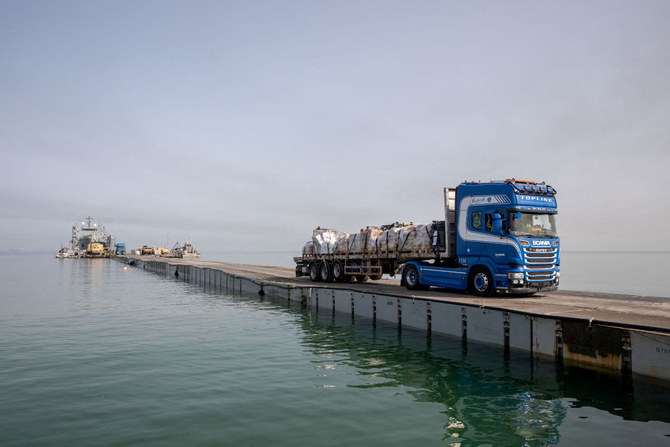
- Crowds overrun some of the first trucks coming from the new US-led sea route and taking its contents over the weekend, leading to a two-day suspension of aid distribution
- At maximum capacity, the pier would bring in enough food for 500,000 of Gaza’s people. US officials stressed the need for flow through open land crossings for the remaining 1.8 million
WASHINGTON: A six-day-old US pier project in Gaza is starting to get more aid to Palestinians in need but conditions are challenging, US officials said Thursday. That reflects the larger problems bringing food and other supplies to starving people in the besieged territory.
The floating pier had a troubled launch, with crowds overrunning some of the first trucks coming from the new US-led sea route and taking its contents over the weekend. One man in the crowd was shot dead in still-unexplained circumstances. It led to a two-day suspension of aid distribution.
The US military worked with the UN and Israeli officials to select safer alternate routes for trucks coming from the pier, US Vice Admiral Brad Cooper told reporters Thursday.
As a result, the US pier on Wednesday accounted for 27 of the 70 total trucks of aid that the UN was able to round up from all land and sea crossings into Gaza for distribution to civilians, the United States said.
That’s a fraction of the 150 truckloads of food, emergency nutrition treatment and other supplies that US officials aim to bring in when the sea route is working at maximum capacity.
Plus, Gaza needs 600 trucks entering each day, according to the US Agency for International Development, to curb a famine that the heads of USAID and the UN World Food Program have said has begun in the north and to keep it from spreading south.
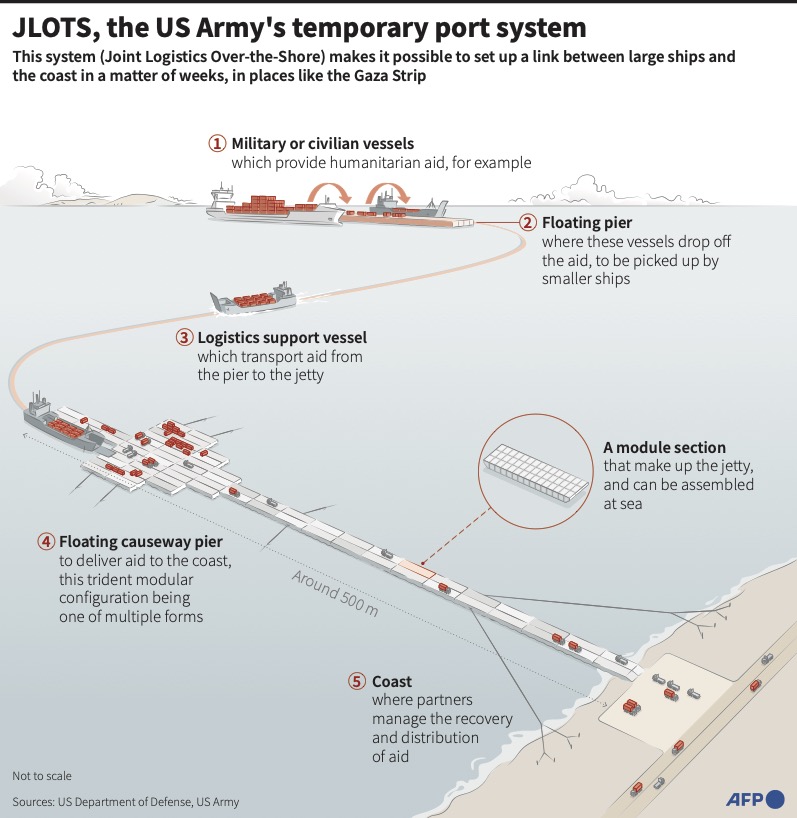
Only one of the 54 trucks that came from the pier Tuesday and Wednesday encountered any security issues on their way to aid warehouses and distribution points, US officials said. They called the issues “minor” but gave no details.
A deepening Israeli offensive in the southern city of Rafah has made it impossible for aid shipments to get through the crossing there, which is a key source for fuel and food coming into Gaza. Israel says it is bringing aid in through another border crossing, Kerem Shalom, but humanitarian organizations say Israeli military operations make it difficult for them to retrieve the aid there for distribution.
The Biden administration last week launched the $320 million floating pier for a new maritime aid route into Gaza as the seven-month-old Israel-Hamas war and Israeli restrictions on land crossings have severely limited food deliveries to 2.3 million Palestinians.
For all humanitarian efforts, “the risks are manifold,” Daniel Dieckhaus, USAID’s response director for Gaza, said at a briefing with Cooper. “This is an active conflict with deteriorating conditions.”
Dieckhaus rejected charges from some aid groups that the pier is diverting attention from what the US, UN and relief workers say is the essential need for Israel to allow full access to land crossings for humanitarian shipments.
For instance, Jeremy Konyndyk, a former USAID official now leading Refugees International, tweeted that “the pier is humanitarian theater.”
“I would not call, within a couple of days, getting enough food and other supplies for tens of thousands of people for a month theater,” Dieckhaus said Thursday when asked about the criticism.
At maximum capacity, the pier would bring in enough food for 500,000 of Gaza’s people. US officials stressed the need for flow through open land crossings for the remaining 1.8 million.
Three US troops have non-combat injuries during Gaza pier operation
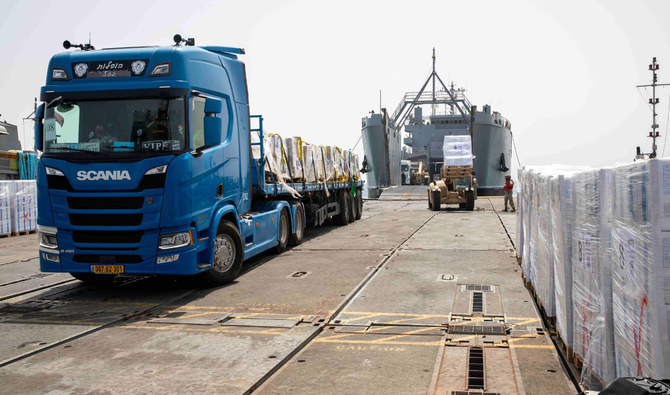
WASHINGTON: Three US troops suffered non-combat injuries in the effort to make a temporary pier off the coast of Gaza into a conduit for humanitarian aid, with one in critical condition at an Israeli hospital, US officials said on Thursday.
The injuries were the first for US forces during the latest operation to bring humanitarian aid to Palestinians.
The pier was announced by US President Joe Biden in March and involved the military assembling the floating structure off the coast. Estimated to cost $320 million for the first 90 days and involve about 1,000 US service members, it went into operation last week.
US Vice Admiral Brad Cooper, the deputy commander of US Central Command, told reporters that two of the troops had a sprained ankle and a minor back injury.
“Two were very minor, routine injuries. Those individuals returned to duty,” Cooper said.
A third service member, injured on a ship at sea, was medically evacuated to a hospital in Israel, he said. A US defense official, speaking on the condition of anonymity, said the individual was in critical condition.
US lawmakers have voiced concern about the risks to positioning US troops off the coast of Gaza. Biden has said they will not step foot in the war-torn city itself.
The Pentagon has said it will prioritize the safety of US military personnel.
“We’re clear eyed and we continue to look at force protection all day, every day and as it stands now we assess the operations can continue,” Cooper said.
Social media images showed a US air defense system, known as the Counter Rockets, Artillery and Mortars (CRAM), firing into the sky while on the pier. US officials said troops were testing the system.
Daniel Dieckhaus of the US Agency for International Development said that since the pier opened last week, about 506 metric tons of aid had been handed off to humanitarian groups inside Gaza. About a third of that has not yet been distributed but would be soon, he said.
Medic says Gaza hospital under Israeli siege for fifth day
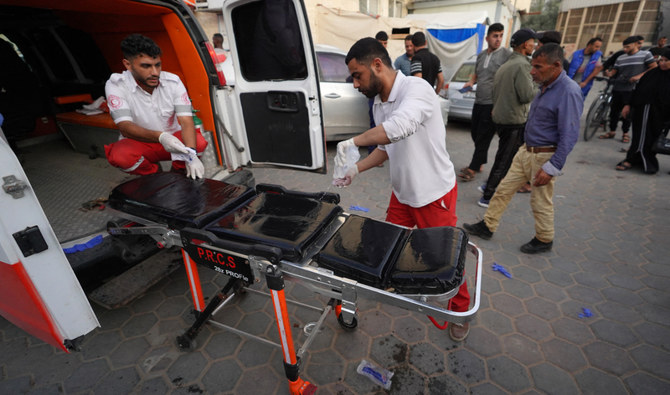
GAZA STRIP: A senior official at Al-Awda Hospital in northern Gaza said it was under Israeli military siege for a fifth straight day on Thursday after soldiers stormed it the previous day.
“We are still under siege for the fifth day in a row,” said the hospital’s acting director, Dr. Mohammed Saleh.
“Soldiers are present in the hospital’s courtyard and nearby houses,” he said, adding that there was “continuous gunfire and shelling” toward it.
Troops stormed the hospital building on Wednesday evening, he said.
“The hospital was stormed, and staff were forced to leave. I currently have only 13 staff, 11 patients, and two women accompanying wounded children,” Saleh said.
World Health Organization chief Tedros Adhanom Ghebreyesus said on social media platform X that 140 staff, patients, and accompanying adults were inside the hospital when troops stormed it.
The WHO visited Al-Awda regularly in April to deliver medical supplies and fuel, but on Tuesday Ghebreyesus said snipers were targeting the building and artillery had hit the fifth floor.
On Tuesday, patients and staff were also evacuated from another hospital in northern Gaza, Kamal Adwan, its director, Dr. Hossam Abu Safia, said at the time.
“These are the only two functional hospitals remaining in northern Gaza. Ensuring their ability to deliver health services is imperative,” Ghebreyesus said in Geneva.
Israeli troops have previously raided other medical facilities in Gaza, including Al-Shifa in Gaza City, the territory’s largest hospital, which was reduced to rubble after an operation in March, the WHO said.
Bahrain’s King Hamad says he is looking forward to improved relations with Iran
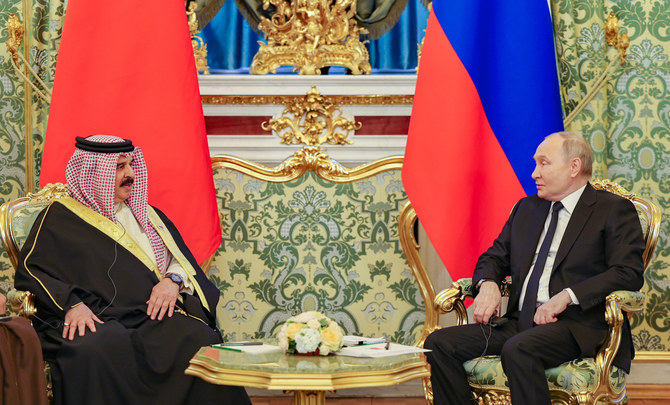
- King meets Russian President Vladimir Putin at the Kremlin
RIYADH: Bahrain’s King Hamad said his country was looking forward to improving its relations with Iran during a meeting with Russian President Vladimir Putin at the Kremlin.
The king added that there was no reason for Bahrain to postpone the resumption of diplomatic relations with Iran, the Bahrain News Agency reported on Thursday.
The king and Putin discussed the war in Gaza, regional and international efforts aimed at reaching a ceasefire, and the release of hostages and detainees. They also focused on providing humanitarian aid without obstacles to the territory’s civilian population.
They highlighted the importance of advancing the course of diplomatic action to settle the Palestinian-Israeli conflict, and achieving a Palestinian state with East Jerusalem as its capital. The leaders also said efforts to recognize the Palestinian state and accept it as a permanent member of the UN should be supported.
They also stressed the importance of the UN Security Council assuming its responsibilities toward resolving and ending global conflicts, and working to settle them in accordance with the rules of international law and the UN Charter to maintain international peace and security.
The king informed the Russian president of the outcomes of the Arab Summit held recently in Bahrain, adding that Arab countries appreciated Russia’s sympathy for just Arab causes.
The king and Palestinian President Mahmoud Abbas called for the convening of an international conference at the summit, which would take place under the auspices of the UN, to resolve the Palestinian issue on the basis of a two-state solution.
The king added that he hoped to host the conference and requested Russia’s support for it.
Arab Parliament welcomes move to recognize Palestinian state
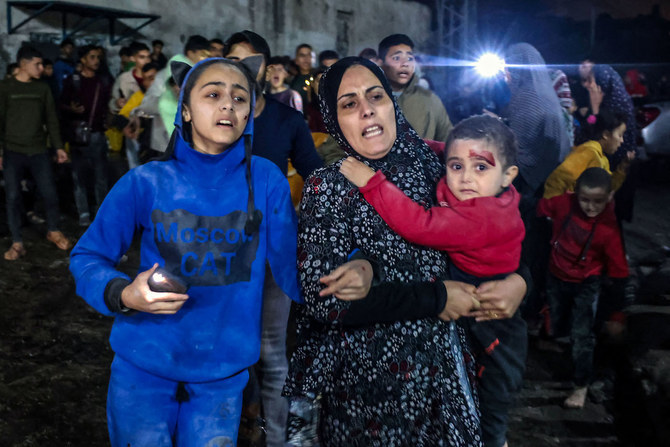
- The parliament described the move as a victory for justice and the right of the Palestinian people to establish an independent state
- Growing international recognition of a Palestinian state represented a practical response to Israel’s plans to “liquidate the Palestinian cause, which will not succeed”
CAIRO: The Arab Parliament has welcomed a decision by the governments of Spain, Norway and Ireland to recognize the state of Palestine.
The prime ministers of the three countries said on Wednesday that they would formally recognize Palestine as a state on May 28.
All three said they hoped the decision would accelerate efforts toward securing a ceasefire in Israel’s war against Hamas in Gaza, now in its eighth month.
The parliament described the move as a victory for justice and the right of the Palestinian people to establish an independent state.
It said the decision was a “new victory for the Palestinian cause and Palestinian diplomacy,” and an important step toward recognition by many countries worldwide.
The parliament said the recognition supported the legitimate rights of the Palestinian people, foremost of which is the establishment of an independent state with the city of Jerusalem as its capital.
It said that the announcements come at a time when Israel is working to destroy the Palestinian cause through “ethnic cleansing and forced displacement against civilians, including children, women, and the elderly, against whom war crimes and crimes against humanity are being committed.”
Growing international recognition of a Palestinian state represented a practical response to Israel’s plans to “liquidate the Palestinian cause, which will not succeed,” it added.
The parliament called on countries that have not yet recognized the state of Palestine to take a step toward “ending the historical injustice to which the Palestinian people have been exposed for decades of occupation and per the internationally recognized two-state solution based on international legitimacy resolutions.”
It called on the international community and all countries to stand with the Palestinian people and their just cause.
Ireland has said it will upgrade its representative office in the West Bank to a full embassy, while the Palestinian mission in Ireland will also be offered full embassy status.





